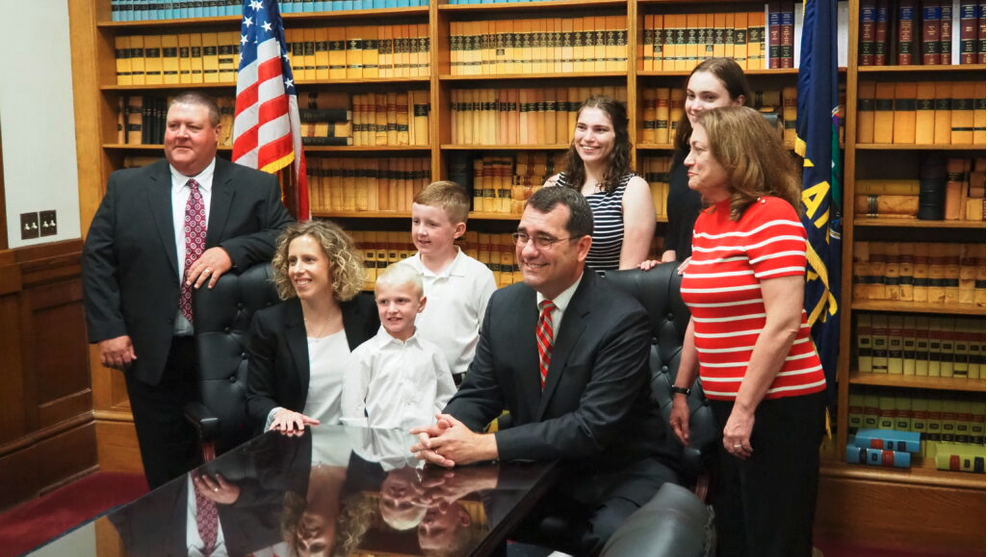
By TIM CARPENTER
Kansas Reflector
TOPEKA — Republican gubernatorial candidate Derek Schmidt proposed Wednesday elimination of state tax on benefits and income from Social Security, IRAs, annuities and other retirement vehicles to curtail population outmigration from Kansas.
Schmidt, the attorney general and presumed November opponent of Democratic Gov. Laura Kelly, said the recommended incentive package would be blended with existing income tax exemptions applicable to military, federal and in-state government pensions to help retain or attract retirees as well as draw interest from individuals preparing for retirement. The policy shift might help Kansas businesses in workforce recruiting, he said.
“To every retiree considering leaving Kansas after a lifetime of working and living here, we want you to stay,” Schmidt said. “To every retiree in another state looking to move, come to Kansas. We’re going to give you another reason to remain or return to Kansas by helping you retire tax free.”
Schmidt said the proposal would zero out state income tax on Social Security retirement benefits, out-of-state public pensions, private pension benefits, defined benefit retirement plans, defined contribution retirement plans like 401(k)s, retirement annuities, individual retirement accounts, retirement plans maintained or contributed to by an employer, retirement plans maintained or contributed to by a self-employed person as an employer, and deferred compensation retirement plans or any earnings attributable to a deferred compensation plan.
The U.S. economy has endured the COVID-19 pandemic, inflation and stock market fluctuations that contributed to erosion of the bottom line in retirement accounts.
Schmidt said adoption of the proposal by the Legislature would bring Kansas in line with South Dakota, Texas and 10 other states — Iowa will soon join that group — that exempt all private retirement income from state taxation.
The Social Security provision would bring Kansas together with six other regional states that exempt those benefits from state income tax, he said. Currently, Kansas taxes Social Security if a person with a federally adjusted gross income of more than $75,000 annually.
Cost of Schmidt’s “Retire Tax Free” initiative to the state treasury would escalate over the next three years. Under his proposal, the cost of exempting Social Security benefits would grow from $32.5 million in the 2023 fiscal year, to $109 million in fiscal 2024 and to $112 million in fiscal 2025.
Fully exempting all private retirement income would diminish state revenue by $69.9 million in fiscal 2023, $233 million in fiscal 2024 and $236 million in fiscal 2025.
Schmidt said in a statement that he would “work closely” with the Legislature to determine a fiscally responsible method of working the retirement taxation reforms into the state budget.
The 2022 Legislature approved and Kelly signed a bill investing $1.1 billion in the state’s public employee retirement system. Lawmakers also created a $500 million budget stabilization fund.
The House, Senate and governor implemented a law to gradually eliminate the state’s sales tax on groceries over three years. Kelly had proposed an immediate end of the 6.5% state sales tax on food. Meanwhile, a cluster of tax reform bills were passed, including one featuring $50 million in property tax relief for businesses closed during the pandemic.
The Schmidt campaign — his running mate is Katie Sawyer — said an analysis by Kiplinger indicated Kansas ranked third worst in the nation in terms of income, sales and property tax burden.
According to surveys compiled by moving companies and data from the U.S. Census Bureau, Kansas ranked 11th worst in 2021 in terms of outbound migration.
“To have a brighter future, Kansas must grow,” Schmidt said. “Our state’s heavy tax burden is one of the significant obstacles to population growth and a significant reason so many Kansas retirees move away, taking with them their lifetime of talent, civic involvement and savings.”






